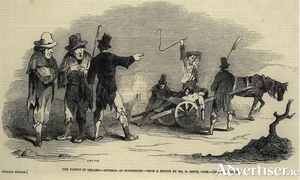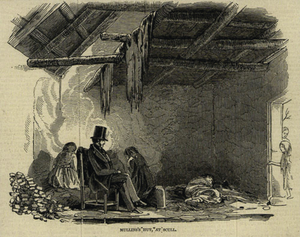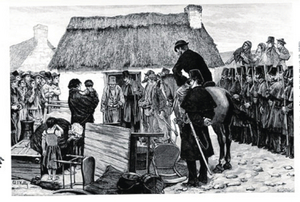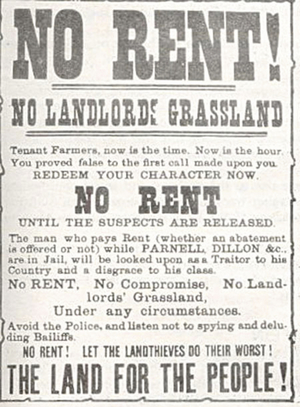Search Results for 'Great Famine'
54 results found.
Getting rid of the troublesome women

One of the remedies in dealing with overcrowding, and rebellious behaviour from frustrated and angry women in the workhouses during the famine years, was assisted emigration. This was done on a massive scale. Between 1848 and 1850, 4,175 women were sent direct from the workhouse system to Australia. This was in addition to the thousands already sent away assisted by landlords and other schemes to clear the land of unproductive tenants. The only cost to the individual Poor Law unions was for new clothes, and travel expenses to Plymouth, from where the girls embarked to the colony.
The Great Famine - A watershed in Irish history

During the seven years of the Great Famine approximately one million people died. A million more emigrated causing Ireland’s population to fall by between 20 and 25 per cent. The initial cause of famine was a potato disease which ravaged potato crops throughout Europe during the 1840s.
A ‘selfish, perverse and turbulent’ people

As the Great Famine strengthened its fearsome grip on Ireland in the late 1840s and early 1850s, the people were doubly unfortunate that Charles Trevelyan, the Assistant Secretary to the British Treasury, had responsibility for Irish Famine relief.
How artists changed Britain’s perception of the Great Hunger

Although the Great Irish Famine, which devastated Ireland in the 1840s and early 1850s, happened at a time when photography was only in its experimental stage, we still have vivid images of the appalling suffering that the vast majority of the people endured. A suffering that was heightened by systematic neglect by government, the total absence of a comprehensive humanitarian plan of relief, and the law of the land which only supported the rights of landlords.*
Was James Hack Tuke the Oskar Shindler of his day?
A surprising rescuer of the Tuke assisted emigration scheme from the west of Ireland came from the London government. After the first group of 1,315 people had sailed from Galway for America on April 28 1882, the Tukes’ emigration fund was practically exhausted. Yet the demand for places grew each day. Now more than 6,000 applications, mainly from the Clifden area, but also from Belmullet, Newport and Oughterard, poured into the Clifden union where James Hack Tuke had his office. While poverty and famine remained endemic in the west of Ireland, people with spirit must have felt that the day-to-day grind was never ending. The threat of another Great Famine was very real. They wanted a new life.
James Hack Tuke and his plan to assist emigration from west of Ireland
The agricultural crisis of 1879, and growing civic unrest, prompted the Society of Friends in England to send James Hack Tuke to the west to inquire into conditions and to distribute relief. Tuke, the son of a well-to-do tea and coffee merchant family in York, England, published his observations in Irish Distress and its Remedies: A visit to Donegal and Connaught in the spring of 1880. In clear-cut language he highlighted the widespread distress and destitution at a time when the British government questioned the extent of the crisis.
The gathering storm

The threat of another famine in 1879, within living memory of the horror and catastrophe of the Great Famine some 29 years earlier, brought renewed terror to the vulnerable tenant farmers in the west of Ireland. This time it was not just the humble potato, but severe weather conditions which devastated crops and feed stuffs over a three year period. Farm incomes dropped dramatically, landlords fussed that rents would not be paid. Whereas some landlords were patient, others warned that evictions would follow if rents were not paid on time.
An Taibhdhearc to screen classic Famine TV series

TALES FROM The Poorhouse, the acclaimed 1990s Irish-langauge TV series, which starred Brendan Gleeson, Mick Lally, and Ruth McCabe is being screened in An Taibhdhearc.
Three day conference on The Great Famine
A three-day conference on The Great Famine, featuring Irish and American academics, will take place this weekend in Ballinasloe.
Famine documentary to be broadcast this weekend
A programme looking at the first forced emigration scheme on the Mahon Estate in Strokestown, County Roscommon during the Great Irish Famine, is to broadcast on Shannonside Northern Sound.

